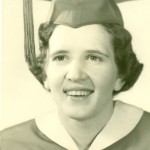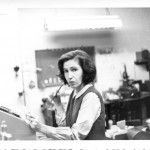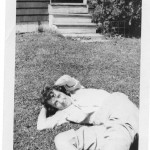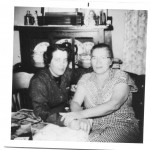High school English teacher Marie Kleiderlein examines her upbringing and experience in the field of social services in order to explain her personal affiliation with various feminisms. She also explores ways that her tenure as a teacher has shaped her thinking about feminism and education. She identifies areas of interest for further research regarding feminist theory.
I saw life through rose colored glasses. As a child, I was socialized to be feminine, and as I observed the world around me, I was relieved to be a girl. It felt good to be able to express my emotions freely. I assumed all girls were adored like I was. In time I lost my naiveté and began to question the gendered world around me. What could possibly justify such inequality? Whatever my perception, I am limited in my ability to understand because I am relegated to a biased view of the world, one contingent upon gender.
I am grounded in liberal feminism, in the conviction that, “…women should be as free as men to determine their social, political and educational roles, and that any laws, traditions and activities that inhibit equal rights and opportunities should be abolished”. As such, I recognize the value of both traditional and non-traditional roles for women as long as they are freely chosen and not merely the result of societal expectations of propriety or a women’s sense of powerlessness.
I respect my married aunts’ choices to be wives and mothers in the traditional sense. If they were ever unfulfilled, they did not show it. They came to family reunions in station wagons, with large broods of five, six, and seven children and coolers full of potato salads, squash casseroles and Coca-Cola. By day’s end, they retrieved their husbands from the poker table and rounded up their children, waving happily goodbye to everyone. Their husbands seemed devoted and respectful, leading me to believe that my aunts were satisfied. They never seemed subservient to their spouses. If anything, they acted as the heads of their households. I would never try to get anything past my aunts, but my uncles could always be bought with a smile. Of course, their private lives were off limits to me.
We sat apart from the larger groups at the family reunion, a table of misfits, including my mother, my brother, and myself, our unmarried  aunt, a school teacher, a widowed aunt, and our uncle, a life-long bachelor. In later years our table took in anyone without a unified family, but mostly our ranks dwindled through attrition.
aunt, a school teacher, a widowed aunt, and our uncle, a life-long bachelor. In later years our table took in anyone without a unified family, but mostly our ranks dwindled through attrition.
My grandparents were dismayed that their one daughter had no interest in dating or marrying a man; they found her decision to get an education acceptable, if not ideal, because she had to support herself. They eventually took pride in her accomplishments. Yet, she still remembers the sting of their disapproval when they realized there was “no hope” for her to ever marry. In the family address book where my grandmother listed the birthdates of all her descendants, she wrote “no hopes” next to my aunt’s name. While it was somewhat funny to see this note in my grandmother’s handwriting, it was also a painful reminder of how my aunt had struggled for acceptance in the family only to fail to gain her mother’s unmitigated approval and support. She was the only female in our family to defy expectations entirely.
Another aunt was somewhat of an enigma in the family. Although she did marry, she never had children. She was widowed for much of her adult life. She seemed to have no interest in a companion after her husband’s death. Instead, she was busy building extravagant gifts. Doll houses were her specialty, designed to look like her nieces’ actual homes, complete with electricity and ringing door bells. She worked in a factory, drove a truck and “tinkered” with things. Her truck bed was full of wood and tools; she wore jeans and flannel shirts, and preferred undershirts to bras. She was wildly popular with everyone in the family, a “giver,” different but accepted for all of her eccentricities because she was so generous.
My mother was divorced from my brother’s father and widowed by my father, a single mother for most of our childhoods. She worked to support my brother and me as a customer service representative at an insurance agency. In thirty years she was never promoted to “sales,” a job reserved only for men in the small, locally-owned business. Our mother never took a sick day.  She worked full-time, and while our family was not wealthy by any means, we had a cleaning lady and everything we needed. I have no idea how she did so much with so little. When she retired in 1998 after three decades of exceptional service to the company, she was making just over $22,000.
She worked full-time, and while our family was not wealthy by any means, we had a cleaning lady and everything we needed. I have no idea how she did so much with so little. When she retired in 1998 after three decades of exceptional service to the company, she was making just over $22,000.
I assumed that our mother worked because my father had died, but I was to learn years later that she always worked by choice, even when she was married. We seemed to have less money than the fathered-families, but our mother was nicer, so I counted myself lucky.
Recently, a family member explained to me that my mother was my grandmother’s favorite daughter because she was so pretty, the epitome of femininity. My grandparents were overjoyed when she married my father, a jeweler and well-known businessman, because it elevated the family’s status. Unfortunately, my father died when I was seven months old, leaving my mother alone to raise us with little more than the “status.” At 37, she had a 14 year old boy and a new baby. She was a single mother long before it was common.
My mother was accepted as a working woman because she was widowed, and because she was a loving mother. As Lorber (2005) describes, women who chose careers were “suspect” unless they were successful wives and mothers too (p. 27). My mother struggled to find adequate child care and cofounded a day care center after learning that her sitter was drugging me to keep me quiet throughout the day. She did bookkeeping for that facility for years in order to help ensure that there was reliable and safe child care for other working parents in our community. She was a conscientious mother who never complained about her situation, and met our needs with poise and determination. She exhibited tremendous self respect and dignity.
While I cannot say that I was raised in a gender-neutral household, I was brought up to believe that I could be whatever I wanted to be. My brother was equally encouraged. Education was stressed by our mother who instilled in us a love of books and reading. Through her example, we questioned why our government was not more diverse and better representative of its constituents. We witnessed her taking courses to further her education, earning insurance and real estate licensure. She used to say every fall, “This time of year, I wish I could go back to school too.”
My mother and my aunts were my first feminist educators and my first educators about feminism. Through their examples I learned that there is not one definition of what a woman is or what a woman does. Regardless of each woman’s status within their respective households and in society, I found them all to be intelligent, determined, and strong. I admired them all.
I am rooted in liberal feminist ideals with a staunch interest in the objectives of socialist feminism. While I attribute my basic belief system  to my female role models while growing up, I adopted the views of socialist feminism as a young adult. I was married and had a daughter when I started college at age 22. While a full-time student, I juggled my role as wife and mother with a part-time job and provided care to both my mother and mother-in-law, both of whom were in failing health. I quickly learned that I needed help managing it all, yet household duties were never shared equally with my husband, nor were the responsibilities of helping our ailing parents. I was the primary caregiver to our child as well; it was often easier to do the work than argue about it. I was well aware of the imbalance in my life yet unwilling to make the necessary changes. To a large degree, I accepted my role as the woman in our home and willingly became the caretaker of others.
to my female role models while growing up, I adopted the views of socialist feminism as a young adult. I was married and had a daughter when I started college at age 22. While a full-time student, I juggled my role as wife and mother with a part-time job and provided care to both my mother and mother-in-law, both of whom were in failing health. I quickly learned that I needed help managing it all, yet household duties were never shared equally with my husband, nor were the responsibilities of helping our ailing parents. I was the primary caregiver to our child as well; it was often easier to do the work than argue about it. I was well aware of the imbalance in my life yet unwilling to make the necessary changes. To a large degree, I accepted my role as the woman in our home and willingly became the caretaker of others.
After college, I began a career in human services, working with disabled persons and the homeless. I acted as an advocate in social and educational settings and in the workplace. I learned the realities of life among the disabled, the victimized, and the poor, many of whom were women. In time, I began to realize the connectedness between social class, gender and race and to appreciate the complexity of social problems, as well as the difficulties people face as they try to change their social standing and improve their lives. I learned the way that government and society try to make up for unequal opportunities and acknowledged the absolute need for programs such as food stamps, disability benefits, mental health facilities, domestic violence shelters, rape crisis services, legal aid, etc. I assisted numerous women, helping them to access services, thereby empowering them. I saw first-hand the disadvantages women face, problems compounded when women are disabled and/or poor and when they come from a minority racial or ethnic group. As Lorber (2005) describes, women are often reduced to second-class citizenship.
While working as a case manager for a homeless program at the YWCA, there was an inside joke among the staff that a woman who moves in with a man improves her situation far more than a woman who utilizes every program and service available to her but chooses to remain single. Of course, this was seldom a real or lasting solution to a woman’s problems, and it certainly was no joke. Often a woman was rendered homeless due to separation or divorce.
Advocacy for a woman or a man usually means advocacy for their dependent children, both male and female. There is a tremendous need for concern for the children of the disadvantaged. As a young woman, I found myself powerless at times to affect the lives of innocent children whom I knew were in need. I remember Tori vividly. Both of her parents were mentally disabled;  I was their case manager. When she was born, we realized she would likely have developmental delays. Workers came and went constantly, providing every imaginable means of support to the new family. Tori was always sick. She had ongoing colds and ear infections. When I visited, her antibiotic sat on the kitchen counter untouched while Tori lay in her crib in the dark. I pleaded with her parents to be more vigilant, but to no avail. They were indifferent and inattentive; as a result, Tori began to bang her head. I contacted Child Services repeatedly, and they did intervene and remove her from the home, but not soon enough. I watched in horror as Tori deteriorated, and I imagined for the first time that a child might suffer less had he or she never been born. I felt so powerless. I knew that she would likely suffer life-long effects from her first year of life in that home. I thought about our society; I began to see things more realistically. The idealist in me was gone. Life is complicated and often tragic despite my efforts, despite anyone’s efforts.
I was their case manager. When she was born, we realized she would likely have developmental delays. Workers came and went constantly, providing every imaginable means of support to the new family. Tori was always sick. She had ongoing colds and ear infections. When I visited, her antibiotic sat on the kitchen counter untouched while Tori lay in her crib in the dark. I pleaded with her parents to be more vigilant, but to no avail. They were indifferent and inattentive; as a result, Tori began to bang her head. I contacted Child Services repeatedly, and they did intervene and remove her from the home, but not soon enough. I watched in horror as Tori deteriorated, and I imagined for the first time that a child might suffer less had he or she never been born. I felt so powerless. I knew that she would likely suffer life-long effects from her first year of life in that home. I thought about our society; I began to see things more realistically. The idealist in me was gone. Life is complicated and often tragic despite my efforts, despite anyone’s efforts.
In all areas of my life, I try to be strong and supportive, to have high expectations, to look for the positive in others. I struggle with feelings of inadequacy, something I largely attribute to the socialization of girls, and to various degrees I judge and rejected myself. Yet, I keep progressing, advanced myself through education, and have managed to realize many of my dreams. I feel concern for girls who are unable to cope with issues of self-esteem and self loathing, and I wonder how gender stereotypes are holding them back, not just the negative influences from the outside world but also the prejudice within each girl’s own mind, her core beliefs about her worth or lack thereof; those biases are not natural, but a result of socialization.
I am fascinated by self perceptions and the implications of those perceptions. As Weedon (1987) suggests, language is the place where one’s sense of self is constructed, a subjectivity that is socially produced (p. 21). The post-structural idiom, that language is not an expression of one’s uniqueness but instead a social product, is of special interest to me. I think about how we use language to make sense of the world and also to perpetuate social norms. Also, self talk is very influential. Although private, it is still language, and still socially constructed. I would like to know more about how one’s sense of identity is wrapped up in issues of gender and how language is detrimental to a healthy self concept.
All of this is transferrable to education because one’s concept of self is so important to achievement. I wonder how much of identity is free from the influences of society. What are the ways in which educators can influence students? In what ways are students’ identities and potential for growth already fixed? What would education be like if people were not molded and limited by gender?
Lastly, I have struggled for years to understand the socialization of boys. I wonder why there are some men who resist gender norms of masculinity while in others the stereotypical behaviors are deeply ingrained. How are socialized behaviors holding males back from seeking and reaching their potential in both education and in life? I am intrigued by feminist studies of men and the “identification of masculinities and their consequences”. I cannot help but be concerned for my male students and wonder what they would be like as learners if they were not held hostage to masculinities. In trying to be masculine, many of them have chosen to reject education. I think about the ways that our society is still dominated by men and restricted by the gendered roles of men. I resent “patriarchal privileges” and see many young males as conflicted by societal expectations. I fear that which is advantageous to them also entraps them.
As a woman and a teacher, I think about gender and its implications for my life and the lives of those around me. A product of my personal experiences, I seek greater understanding of how family, society, and education are impacted by issues of gender. I have seen the “undoing” of gender and recognize how it can be a means of freeing individuals to live more fulfilled lives. I fear that gender is deeply ingrained, and conflicts regarding gender issues will continue for generations to come. Yet, I am hopeful that people can learn to understand and manage the limitations of a gendered world in favor of a more equitable existence.
Marie Kleiderlein, State University of New York at Buffalo
